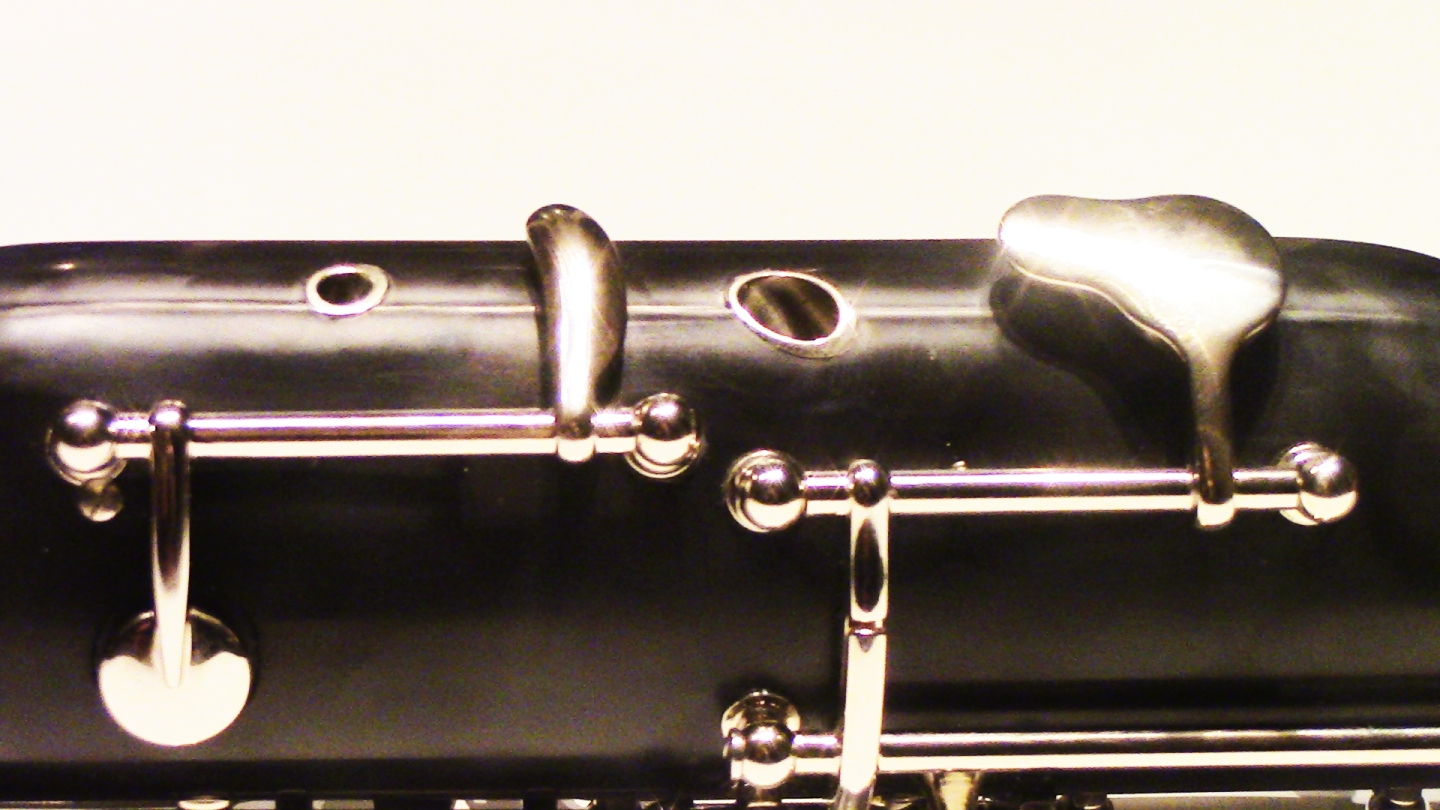The number one comment and follow up question I receive on my YouTube Channel is…
“I want to play bassoon but my school doesn’t have one. Do you know of an affordable quality bassoon option for starting out?”
The key words for everyone is AFFORDABLE QUALITY.
Affordable: The starting prices may feel like a lot of money but when bassoon price options run from $2000-$40,000- this is the lower price end.
Most families of bassoon beginners are understandably hesitant to spend over $5000 for a bassoon beginner who may not practice or want to play in 6 months. And due to the expensive production cost of bassoons most major music companies will not rent the instrument.
Quality: No one wants to invest in an instrument that does not have good intonation, lacks an even scale, is filled with rot, or lacks tone colors. Bassoons with these problems will be a chore to play and lack future resale potential.
In my bassoon journey during my beginner studies I was lucky enough to attend schools that had semi-working instruments. Not great instruments. But an instrument to try. It allowed me and my family the chance to see that the bassoon was the best match for my musical voice.
Now, years later I can laugh and remember that my first bassoon bocal was cracked and leaked. It had an amateur welding job done on the crack (where the whisper key button is located). The result was a puffy enlarged bocal at the welding location that didn’t allow the whisper key to move. After a few months of playing and regularly putting the instrument together the bocal broke into two pieces at the swollen weak welded point.
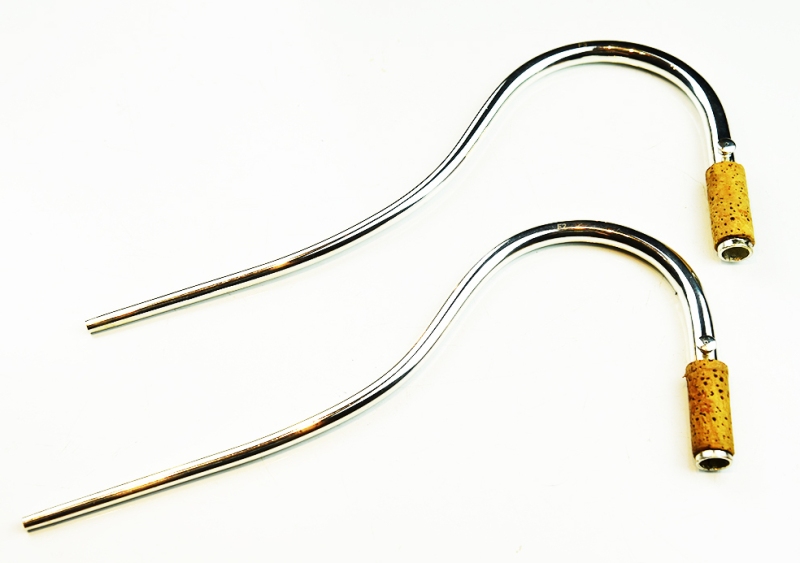
I was heart broken. No more bassoon! It was then that my parents realized we needed to find an instrument to purchase. And we, like many families, were met with the financial challenges every bassoonist endures. We quickly realized that Double Reed Instruments are not as affordable as beginner flute, clarinet, trumpet or trombones.
As a veteran of this experience I understand the need to purchase with perspective. To help families gain information as they face the financial challenges of buying double reed instruments, I always remind my students of the College Scholarship Opportunities for great double reed performers.
To give you an idea of scholarship opportunities- every double reed student at JSU, where I teach, is on scholarship. That can’t be said for all other instruments! Flute and Trumpet performers are so common, it would be tough to say that full studios are on scholarship. And the double reed scholarships at JSU are not an anomaly- throughout the nation double reed students receive hefty college scholarships.
Remember: Buying an instrument, lessons, and reeds is an investment in a student’s long term education AND growth of personal voice.
As a professional bassoonist and educator, I love bassoon and want everyone to have the option to play! Over the past year I have been scouring the market for the most affordable, great playing, full German key system options to share with my viewers.
So let’s dig in to $5000 or Less Mass Market (readily available) Bassoon Options.
Nobel Wood Composite Bassoons are available through Miller Marketing and can be purchased with the Discount Code: ERYNOFT via phone or email to save between $500-1000 on the purchase price.
1(800) 323-3216 or miller445 AT aol DOT com
https://nobelinstruments.com/
WEBSITE DISCOUNT CODE IS: eryno
All of the sound clips of the scales in the video were played on the same Raffe Reed without any added sound editing reverberation. I felt the truest test would sound clips of the bassoons in my living room, not a fancy hall or church and without editing. I did this so you would know what you or your students will sound like on each of the instruments.
Let’s a take a closer look with the assistance of my comparison chart of the Mass Market Available Nobel and Fox Renard Bassoons.
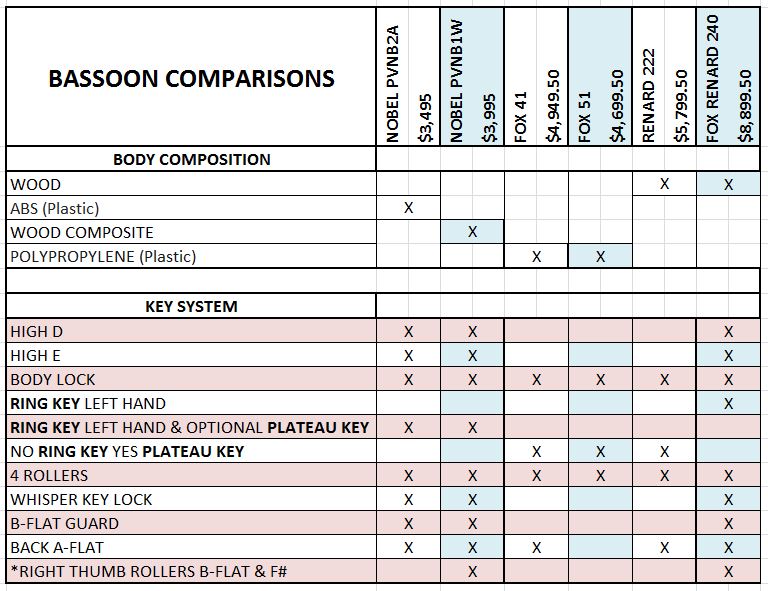
Now Let’s Dig into a Discussion of Keys and Accessories Mentioned in the Chart!

High D Key: The left hand thumb depresses this top key of the system set. Although it is possible to play a High D without this key, it does make it easier and aids in response to notes above High D. This key is used to play in the top register for bassoon: High D-Flat, High D, High E-Flat and E. Great for music written for French Basson but played on a German system.
Which Instruments Have It: Nobel PVNB2A, Nobel PVNB1W, and Fox 240
Which Instruments Do Not Have It: Fox 51, Fox 41 and Fox Renard 222

High E Key: Located on the front of the bassoon, the left hand pointer (first) finger depresses this key. Originally this key started life as the G trill key but soon after was found to have properties that would allow German System Bassoons to play further into the range of French Bassons. This key is a necessity for orchestral bassoonists performing Ravel Piano Concerto in G Major or bassoonists performing solo French Concours literature.
Which Instruments Have It: Nobel PVNB2A, Nobel PVNB1W, and Fox 240
Which Instruments Do Not Have It: Fox 51, Fox 41 and Fox Renard 222

Body Lock: Located next to the bocal well- this is a mechanism that locks the wing and long joint together when putting the bassoon together. For bassoons that feature tapered tenons the Body Lock is unnecessary. Bassoons that have cylindrical tenons utilize the body lock. It may be helpful to note: if the screw within the locking mechanism becomes loose it may begin to rattle and make a bit of noise with the vibration of the instrument.
Which Instruments Have It: ALL
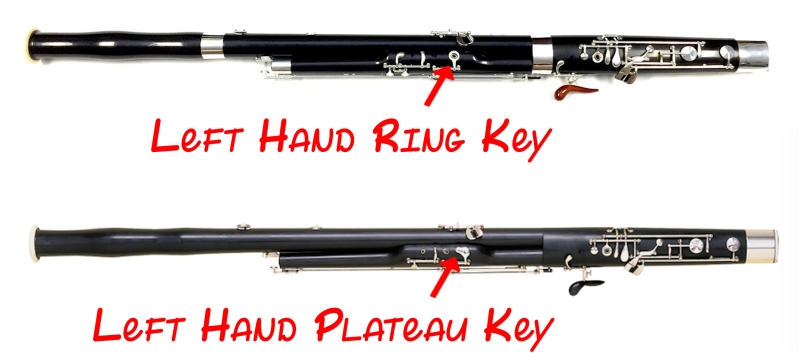
Ring Key Left Hand or Plateau Key Left Hand: The option of a plateau key or a ring that surrounds the tone hole is an option when purchasing German System Bassoons.
For bassoonists that begin very early in life or bassoonists with small hands- a plateau key helps bassoonists cover the tone hole AND whisper key without accidentally also depressing the Low D key.
Personally, as soon as possible I like to switch bassoonists to the Ring Key so that they feel the flesh of their finger cover the tone hole for good hand posture. In my own personal experience as an educator, I have also had problems with the pad underneath the plateau key sticking as spit drains from the tone hole onto the pad.
Which Instruments have Plateau Keys: Fox 51, Fox 41 and Fox Renard 222
Which Instruments have Option of Plateau OR Ring Key: Nobel PVNB2A and Nobel PVNB1W
Which Instrument has a Ring Key: Fox 240


Whisper Key Lock: Great for low register playing, just lock and go! No worries about lack of low note response when switching between whisper key to pancake key to whisper key. This switch depresses the whisper key and holds it down until the switch is released.
The whisper key lock varies in location based on manufacturer. In the Nobel Instruments it is located beneath the whisper key and is flipped upwards (to lock in place) by the left thumb. On the Fox 240 it is located just above the hand rest and is flipped upwards (to lock in place) by the right thumb.
Which Instruments Have It: Nobel PVNB2A, Nobel PVNB1W, and Fox 240
Which Instruments Do Not Have It: Fox 51, Fox 41 and Fox Renard 222

4 Rollers: Rollers that are added to the pinky keys of both the right and the left hand for added ease sliding over the keys, creating stronger technique and speed in performance.
Which Instruments Have It: ALL

B-Flat Guard: A clothing guard located on the boot joint of the bassoon. Great for when fashion calls for ruffles, suit jackets or for those who love cargo pants/shorts. This bar helps keep clothing from creeping under the pads on the back boot joint of the bassoon.
Which Instruments Have It: Nobel PVNB2A, Nobel PVNB1W, and Fox 240
Which Instruments Do Not Have It: Fox 51, Fox 41 and Fox Renard 222
Back A-Flat: Located just below the back F-Sharp Key, the Back A-flat is played by the right thumb. This is sometimes used as an auxiliary fingering but is not utilized in the standard fingering.
Which Instruments Have It: Nobel PVNB2A, Nobel PVNB1W, Fox 240, Fox 41 and Fox Renard 222
Which Instrument Does Not Have It: Fox 51

Right Thumb Rollers B-Flat and F-Sharp: These rollers aid in the speed and technique of sliding between fingerings involving the pancake key.
Which Instruments Have It: Nobel PVNB1W and Fox 240
Which Instruments Do Not Have It: Nobel PVNB2A, Fox 51, Fox 41 and Fox Renard 222
If you are interested in the accessories included in a Nobel PVNB1W Wood Composite Bassoon- there is a Bassoon Back Pack Style Case, Seat Strap, 2 Bocals (different lengths for varying intonation), balance hanger, reed case, cork grease, screw driver, swabs and polishing cloths.
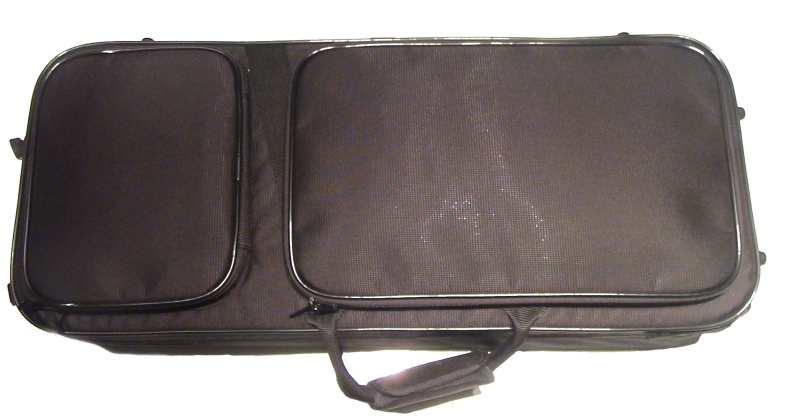
Another key element I like about the Nobel Instruments is the low cost of a bocal replacement. This is probably due to my own challenges as a bassoon beginner starting on a poorly mended bocal!
If by chance a Nobel bocal is broken, bent, or lost the replacement price is often times less than the cost of a repair, only $160 (with the ERYNOFT Discount Code). The cost is significantly less than a Fox Renard bocal replacement cost of $212.
This wraps up another Affordable Instrument Challenge! Be sure to check back next week for the Affordable Used Bassoons Challenge.
Next week’s Blog and Video will feature a full discussion of: what damages to watch out for prior to purchasing a used bassoon, my favorite brands, and model numbers.
I hope you will join me!

